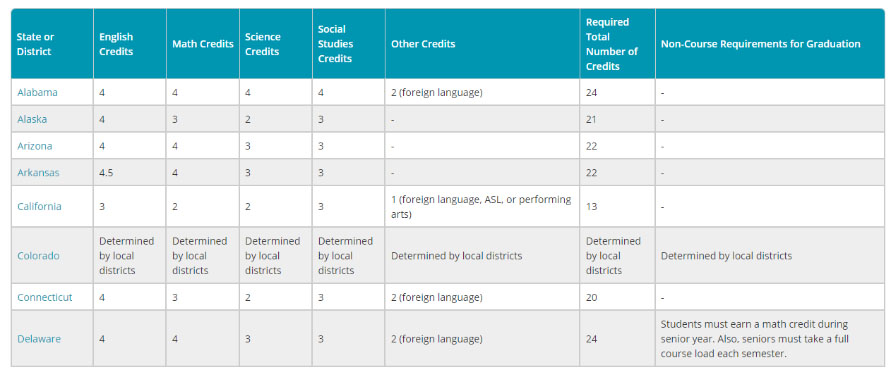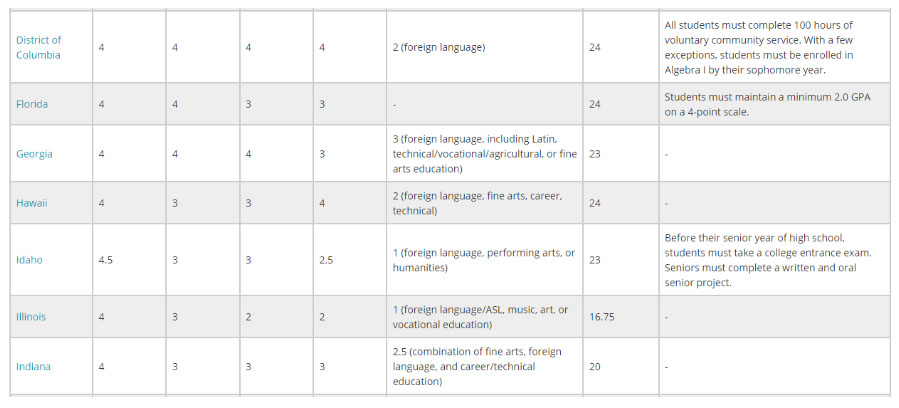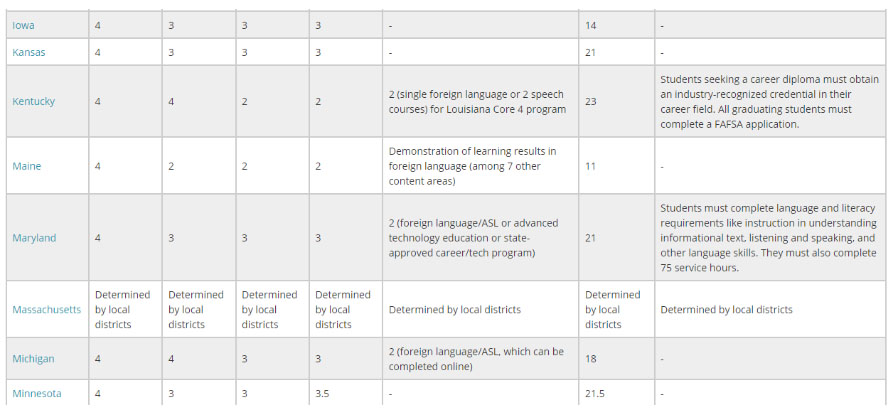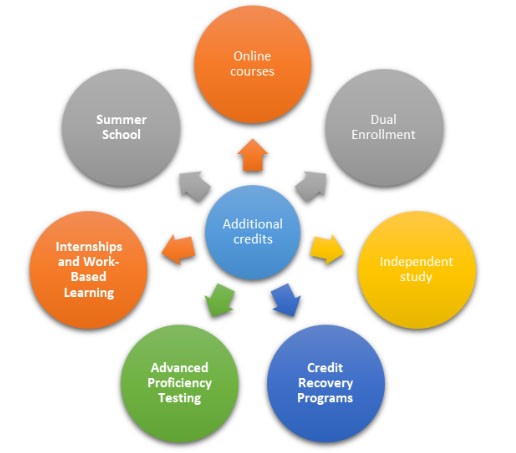The significance of credits to Graduate High school
High school graduation is a pathway to success for both academic and professional endeavors. Graduates have many opportunities ahead of them, including high earnings, employment of their choice, career advancement, and higher education. It is a critical time for students to decide where they belong in the future, and their academic progress can be tracked by evaluating their credit scores. In the US, students must earn certain credits (13.00 to 24.00) to graduate (vary from state to state).
High School Credits
Educational requirements that students must fulfill to get a high school diploma are known as High school credits. For some states, credit hours range from 1.0 credits for a 1 year course to 0.5 for a semester course. Again it majorly depends upon state, local government or a state education department to set these scores. A high school diploma is something that determines students' further education or career path. One of the requirements to get a high school diploma students must earn a certain number of credit scores based on the high school course they opt for and what are the required academic subjects and electives they have to study. Apart from credit, non-credited graduation includes passing standardized tests, completing service hours and maintaining a minimum grade point average.
General Credit requirements for graduation
General credit requirements for graduation in the United States vary from one state to another. In some states, the state’s education department set the standard while in a few states, local high school districts set the required hours. Some of these states include Massachusetts, Colorado, and Pennsylvania. Below we have a list of credits applicable in different states of the USA.



Core subjects you need to graduate
Not all subjects to earn a high school diploma carried an equal weightage. Some subjects are more compulsory for graduation than others like core subjects English, Science, Math and Social studies.
Most of the regular high schools required certain credit hours in these core subjects for one to graduate:
When it comes to foreign languages, the credit policy varies. Some high schools consider foreign language as an academic subject and students must spend 2 years at least to earn credits while some schools consider it as an elective subject. /
Elective credits
Elective credits in addition to academic credits are ones that students must choose out of his/her interest to earn a required credit score. Some of the electives include arts, computer programming, vocational training, photography, culinary arts, career training foreign language education etc. Apart from these subjects, some students can also earn credits based on experience, skill or knowledge. For instance, A student-athlete can receive academic credits by playing in a school soccer or basketball team.
Students who want to take another course from their core subjects like a British Literature course in addition to the English major. Then the prior is considered to be the elective subject.
State Specific Variations
High school credits vary from state to state. Including Utah, West Virginia, Alabama, and Delaware, about a quarter of all states require a notable 24 credits to graduate - a higher standard indeed. Iowa, Wyoming, and Maine have some of the smallest total credit requirements. Take Iowa, for example, which only asks students to earn 14 total credits. Meanwhile, Wyoming and Maine mandate 13 and 11 credits, respectively, before a student's senior year. On the flip side of things, there are states with much higher credit requirements. Local school boards in Massachusetts, Colorado, and Pennsylvania have the power to dictate credit requirements for their students, which sets them apart from states with standardized requirements. In the case of alternative high school diploma programs catering to adults, the requirements for earning a diploma could be diverse. For instance, participants of the Career Online High School initiative offered at public libraries must finish one essential class within two weeks of registration. Upon completion, these graduates will be awarded not just a high school diploma but also vocational certificates for professions such as Commercial Driving or Office Management. Hence, it's crucial to understand that the expectations for these students differ from those of traditional high school systems.
Non-course graduation requirements
Diploma standards in 15 states and the District of Columbia call for non-course-related tasks to be completed. The exact list of requirements varies. Examples include passing statewide standardized tests such as New York's Regents exam, sitting for the SAT or ACT in Tennessee and Idaho, submitting a FAFSA form in Louisiana, finishing a final-year project in Idaho, maintaining a minimum GPA in Florida, and satisfying community service mandates in Maryland and the District of Columbia. In Virginia and Texas, exhibiting communication and critical reasoning excellence, which is evaluated by the various school districts or boards, is critical to receiving a diploma.
Advanced Placement (AP) and Honors Courses
AP and honors courses are some college-level courses that are rather complex and require deep understanding. These courses engage students in critical thinking, self-study and rigorous learning.
These courses help students earn college credits that are beneficial for students who take AP tests ahead of their college time and are capable of hopping on college introductory courses and thus can graduate early to explore new educational horizons and grab impeccable opportunities. High AP scores of students positively impact their ability to take challenges and help them with their college application.
Other ways to earn credits
There are several other ways in which students can earn additional credits or compensate for credits they have lost while failing or not completing certain coursework.

These are a few ways students choose to earn more credits to maintain an ideal credit score to ease their college application process (Vary depending upon the high school or state). Some schools also perform volunteer activities to allow students to receive credits and leave an impact on their application.
Consequence of not meeting credit requirements
Not meeting the required credit score can affect a student’s high school graduation in various possible ways:
Delayed Graduation -
Students might repeat certain classes or take additional to earn the required credit scoreRestriction in attending Graduation ceremony -
Students who fail to meet scores are unable to attend their graduation ceremony.Credit recovery via Summer School -
Students may attend summer school to bridge the credit gap for high school graduation.Limited Job Opportunities -
It's challenging for students with no high school diploma to get their dream job.Parent-student involvement -
Schools involve parents of students with bad credit scores in addressing the challenges their child might be facing.Conclusion
As a US citizen or a student aspiring to study in high school, you must know the significance of earning a good credit score to become a high school graduate with distinction and get into your desired college at once. One must pass the minimum credit threshold to get their high school diploma. It is evident for students to stay informed regarding the credit requirement of their state from time to time and keep up the proactive approach.
FAQ’s
What is high school credit?
High school credits measure a fulfillment of a student's educational requirement. For some states, credit hours range from 1.0 credits for a 1 year course to 0.5 for a semester course. Again it majorly depends upon state, local government or a state education department to set these scores.
What are the general credit requirements in the US?
General credit requirements for graduation in the United States vary from one state to another. In some states, the state’s education department set the standard while in a few states, local high school districts set the required hours. Some of these states include Massachusetts, Colorado, and Pennsylvania.
What are the credit requirements for main/core subjects?
Most of the regular high schools required certain credit hours in these core subjects for one to graduate:
What does it mean by elective credits?
Elective credits in addition to academic credits are ones that students must choose out of his/her interest to earn a required credit score. Some of the electives include arts, computer programming, vocational training, photography, culinary arts, career training foreign language education etc.
What might be the consequence of not meeting the required credit in high school?
Not meeting the required credit score can affect a student’s high school graduation in various possible ways:
Delayed Graduation, Restriction in attending the ceremony, Credit recovery via Summer School, Limited Job Opportunities, Parent-student involvement

 1JOURNEY
1JOURNEY